-
Finding a reliable proxy service provider is tough since many free options log data and risk your privacy.
-
Some proxies slow browsing speeds or can’t bypass geo-restrictions effectively.
-
A trusted premium VPN service like NordVPN Proxy Service, which offers encrypted proxies and global coverage, is a good choice for secure, fast connections.
Searching for a reliable proxy server can feel like navigating a maze. You want something fast, secure, and consistent—but with so many options out there, finding the right one isn’t easy.
The truth is, not all proxy providers are created equal. Some deliver lightning-fast speeds, perfect for streaming or gaming without lag, while others focus on privacy or web scraping without constant blocks. The real MVPs? They strike the perfect balance between speed, price, and trust. They’re rare, but they’re out there.
In this guide, we’ll break down the best proxy server providers available today. We’ve researched their features, tested their performance, and compared prices so you don’t have to. If you’re looking for an affordable residential proxy for everyday browsing or a fast gaming proxy, we’ve got you covered. Whatever your needs are, there’s a perfect fit waiting here.
Top proxy server providers – Quick list
- Bright Data: The enterprise-grade powerhouse with every proxy type you could think of.
- NetNut: Speed-focused provider that uses a unique direct-to-ISP model.
- IPRoyal: Offers great value with straightforward pay-as-you-go pricing.
- SOAX: Flexible pricing with pay-as-you-go plans and rotating residential proxies
- Storm Proxies: Your go-to if you want unlimited bandwidth on dedicated plans.
- Proxy-Seller: A general-purpose reseller with an incredible amount of IPs you can connect to.
- Shifter: Reliable and easy to use for general web scraping.
Types of proxies
Consider proxies like different kinds of vehicles. You wouldn’t take a monster truck to the grocery store for a quick, little run! Choosing the right proxy type is as important as selecting the provider.
Let’s start with the main categories:
- Datacenter vs. Residential: This is the biggest divide. Datacenter proxies often come from cloud servers – they are faster, cheaper, and overall, easier to detect. Residential proxies are from real internet users, providing a level of legitimacy that makes them more difficult to restrict.
- Private shared or rotating: A private proxy is your very own dedicated IP address. A shared proxy is akin to carpooling; the price is cheaper, but part of your ride is shared with someone else. Rotating proxies are a great solution; you designate a time period, and the proxy will automatically switch your IP address from a large pool, which is very helpful in avoiding bans as you conduct web scraping activities.
- SOCKS5: SOCKS5 isn’t even its own IP, by the way. It’s just a protocol—think of it like an off-road truck. Doesn’t really matter what road you’re on: web surfing, gaming, torrenting, whatever, it just powers through. Quite flexible.
Proxy types by use case: Matching the tool to the job
Now let’s get more specific. Many proxy types have specific uses they are optimized for. Here is a list of some options:
- Web scraping proxies: These are the powerhouses that enable your data connection. They are optimized for speed and anonymity and are difficult to detect. In summary, they enable you to scrape the data you are looking for as fast as you can without getting your IP address banned. When you find yourself scraping a larger amount of data, you will get specialized residential proxies or ones designed for your specific tool you are thinking of using.
- Social media proxies: Are you managing several accounts? You’ll want to really blend into the crowd. Social media proxies can often be residential or mobile IPs so that they appear like real users.
- Instagram proxies: They allow you to send and manage several accounts without Instagram flagging you as suspicious.
- Facebook proxies: It works similarly, but specifically for the largest social network in the world.
- SEO proxies: Basically, for monitoring search engine rankings and carrying out competitor analysis across various locations. Search engines such as Google tend to be very proficient at barring scrapers, so these proxies are designed to fly under the radar.
Knowing all of these use cases makes it much easier to narrow down your options. The best proxy server for gaming will focus on low latency (typically a SOCKS5 datacenter proxy), while someone who needs a cheap residential proxy is likely to focus on web scraping or ad verifications.
Best Proxy Server Providers – Detailed List
1. Bright Data
Bright Data (formerly known as Luminati) is the titan of the proxy industry. If you’re looking for a Proxy for a large-scale, mission-critical project, this one’s your spot. They offer an unmatched selection of residential, mobile, and datacenter proxies, 72+ million residential IPs across 195 countries.
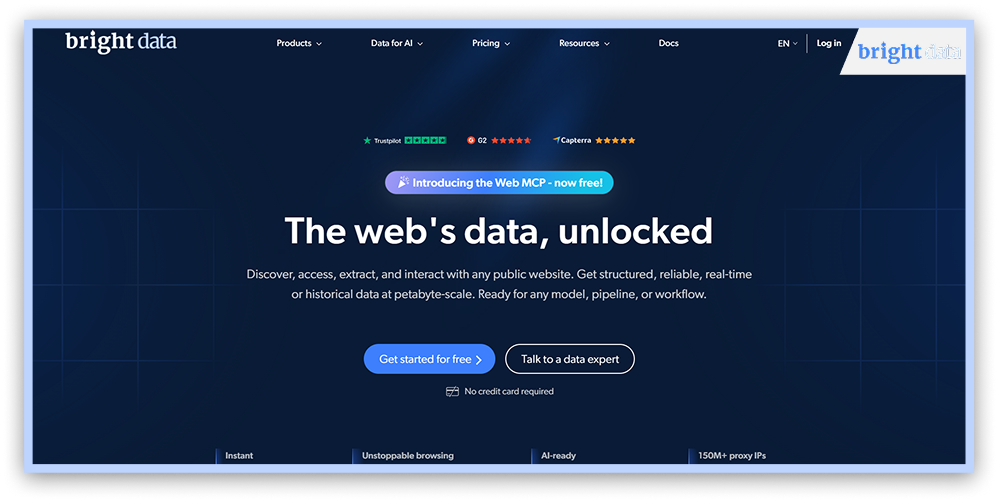
When users talk about the best proxy server providers’ IP address networks, they’re probably referring to Bright Data. It allows you to target specific states, cities, or even mobile carriers. It’s the go-to choice for serious users and enterprises.
2. NetNut
NetNut is a different beast. Instead of peering with devices, it connects directly to the internet service providers (ISPs), which tends to provide a speed advantage for many tasks.
Their one-hop architecture naturally lowers latency, as you’re connecting through an ISP’s server rather than a residential device, which could go offline at any moment. NetNut has static and rotating residential proxies and datacenter options. They have a network of over 52 million IPs, mainly in major markets around the world.
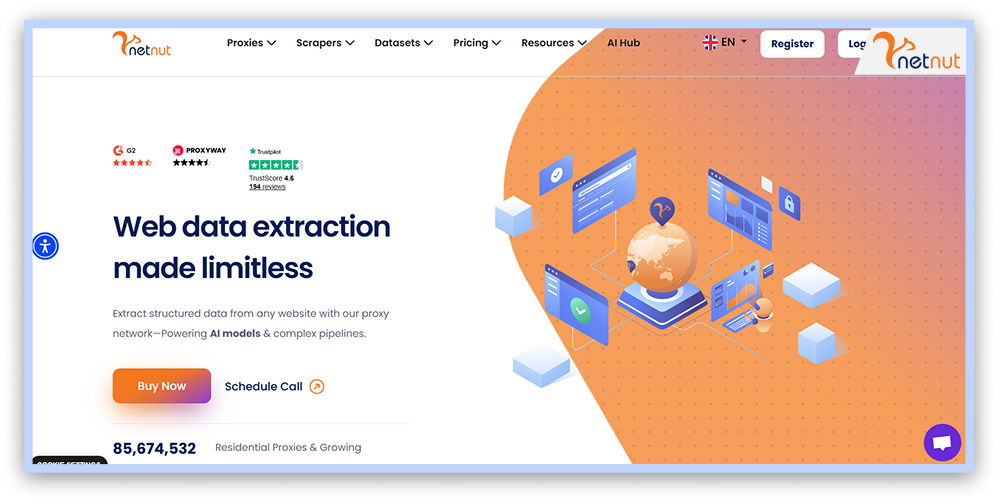
The downside? Their plans start at $300 a month with 20GB of monthly data. NetNut focuses on companies and professionals who want guaranteed performance and uptime. The pricing may make sense if you’re doing large amounts of scraping. If you’re tired of waiting for scraping and crawling sessions to finish loading, certainly NetNut is worth looking into.
3. IPRoyal
IPRoyal keeps things simple and affordable. The uncomplicated pricing model and reliable service make them perfect for freelancers and small businesses. Their cheap residential proxies come with a straightforward, pay-as-you-go plan that you only pay for what you use.
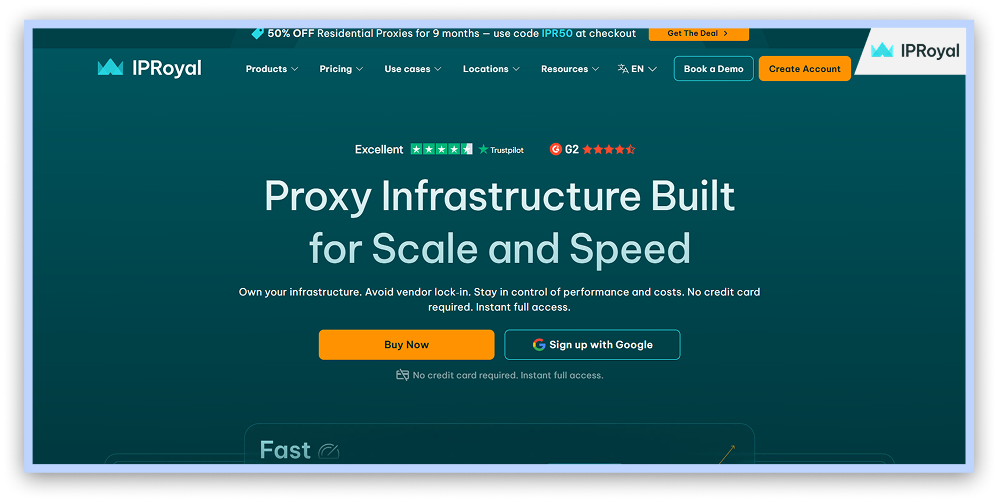
The service provides support for HTTP, HTTPS, and SOCKS5 protocols. You can enjoy unlimited bandwidth when using datacenter plans, and for residential proxies, you have rotating or sticky sessions.
They offer their Residential proxies for prices starting at $7 per GB. Their datacenter proxies run even cheaper – about $1.75 for IPv4 proxies. Their network is not massive, with about 2 million residential IPs. However, for users looking for a budget-friendly option with reliable connections, IPRoyal offers decent value.
4. SOAX
SOAX has a unique pay-as-you-go pricing model – you buy credits and use them as needed, no monthly subscriptions.
They have 8.5 million+ residential and mobile IPs. The site supports automatic rotation, geolocation targeting, and unlimited concurrent connections.
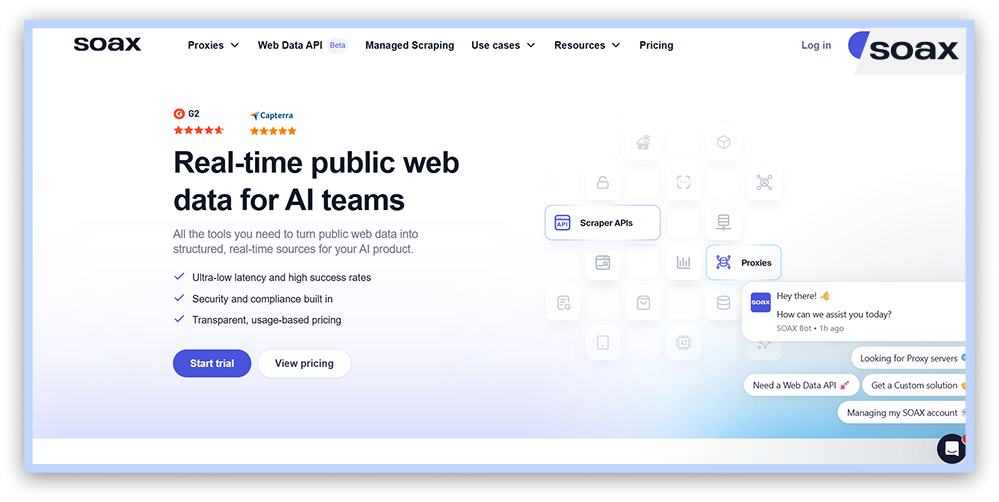
SOAX is particularly useful for users who need proxies occasionally. If you only need proxies from time to time, you won’t be wasting money on a subscription you aren’t using. You can track real-time stats and usage from their dashboard.
Price-wise, you’re looking at $90 to get started for 25 GB. Not exactly bargain-bin stuff, but in some cases, the flexibility totally makes up for it.
5. Storm Proxies
When you’re a power user who requires bandwidth, consider Storm Proxies’ dedicated private proxies, which all have unlimited bandwidth.
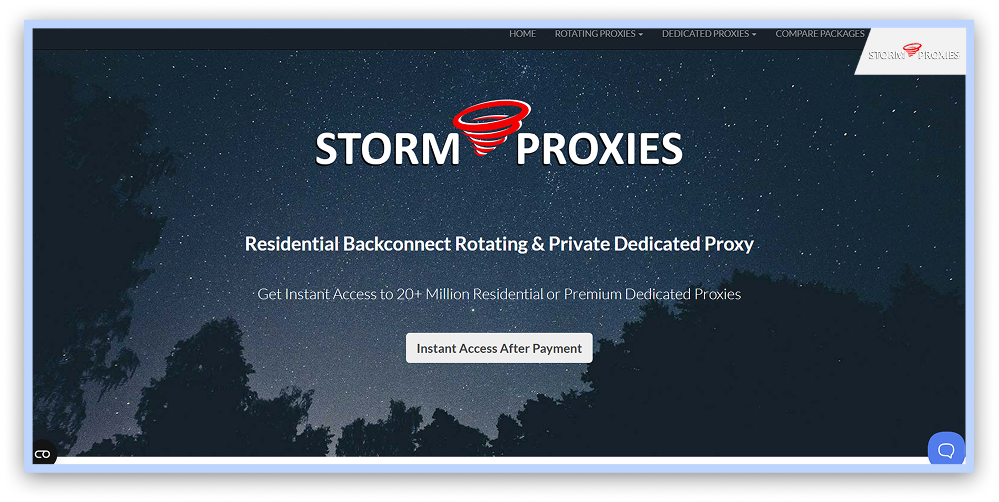
Together with unlimited bandwidth, they are best suited for users running automated scripts or requiring a constant, fast connection for many hours at a time.
6. Proxy-Seller
As a major reseller, Proxy-Seller aggregates proxies from multiple vendors to provide a tremendous and flexible proxy network. This is an excellent “one-stop shop” if you want to try out different types of proxies, as you do not have to create accounts for multiple vendors to test different options.
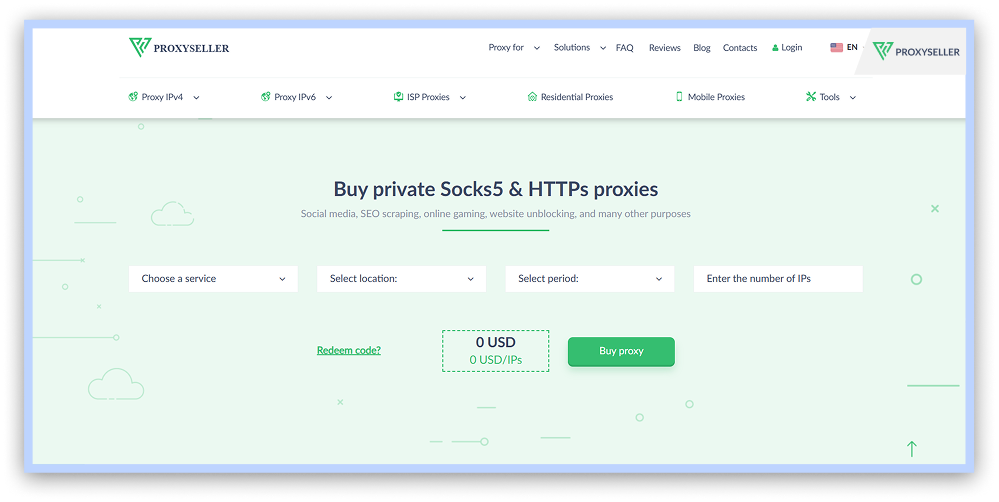
You can select between HTTP, HTTPS, or SOCKS5. They explained that their proxies come from datacenters in more than 25 countries, and each proxy is dedicated to a single user at a time. If you’re wondering about service quality, they don’t sell shared proxies. They hosted a vast pool of backconnect IPs, which is super for avoiding bans.
Prices start at $1.77 per IP, per month, so users can purchase as few as one or scale to hundreds. They even provide ISP proxies, which combine the speed of datacenters with the legitimacy of residential access. It works well for managing multiple accounts, SEO tools, and remembering basic web scraping. It won’t give you residential-level anonymity, but for many tasks, datacenter proxies can get the job done.
7. Shifter
Shifter (formerly Microleaves) provides a stable and trustworthy service that works! They’ve been around for a while, and they’ve developed a solid rotating residential proxy and datacenter proxy network.
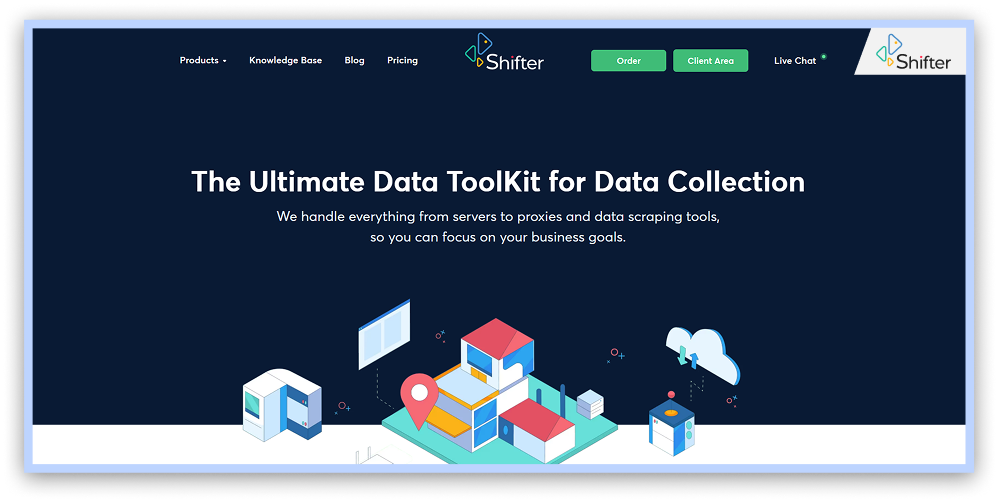
If you just want basic web scraping or automation without the headache, this one’s kind of a no-brainer.
Our methodology: How we selected the best proxy servers
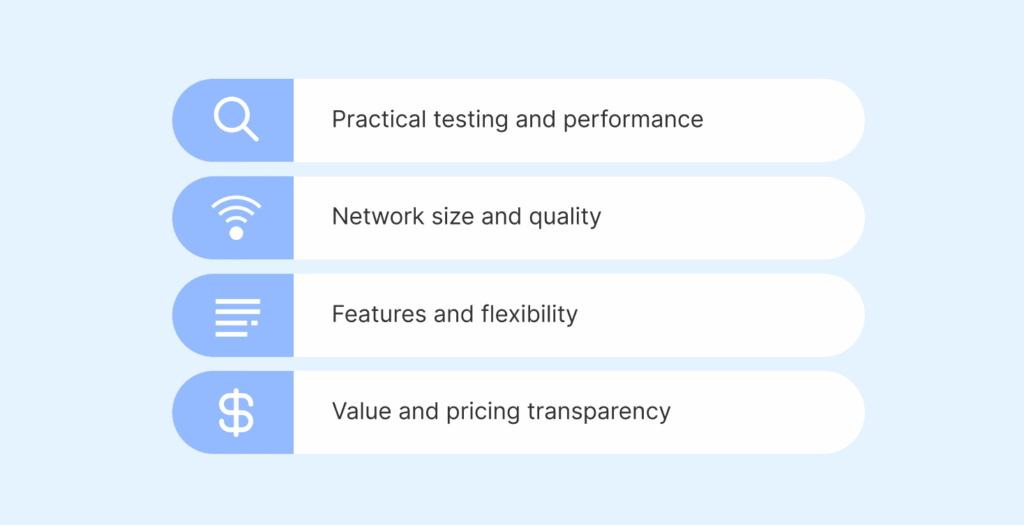
You may be wondering, how did we select these providers? We didn’t throw darts! Instead, we put these services through a strenuous process of real-world testing to distinguish the truly great providers from those that are just average. Our goal was to find out if they could actually deliver a reliable proxy service, whether you were a seasoned developer or just a new user.
Below is a summary of the factors that we considered:
Practical testing and performance
We didn’t merely review the specifications – we used the proxies ourselves. We signed up for accounts, set up the endpoints, and put them through real-world tasks:
- Speed test: We measured the latency and bandwidth to see if the proxies caused any slowdowns.
- Reliability: We observed uptime and the reliability of connections for multiple days because a proxy that cuts off once an hour is unusable.
- Successful experience: For the more scraping-focused proxies, we tested how often we were able to access tougher targets without being blocked.
Network size and quality
Just because a network has a lot of IPs doesn’t really make it a good network. Besides just investigating the IPs being “millions”:
- Variety of network IPs: Does the provider have a good mix of residential vs datacenter IPs? Is there a reasonable geographic presence?
- IP authenticity: Providers that offer residential IPs, which resemble real user traffic, are always more valuable than those using easily detected data-center IPs.
Features and flexibility
The best proxy server providers provide more than just an IP address. We also evaluated:
- Targeting features: How granular is the geo-targeting? Can you pick cities, ASN, or mobile carriers?
- Protocol support: When choosing a provider, ask yourself: Do they support modern protocols like SOCKS5 or HTTPS, or are they still stuck in the past?
- Tooling and APIs: If the interface is looking like it came out of the 90s, or if there’s no quick way for devs to plug in, that is a deal breaker. Oh, and session control? Has to be super handy, too.
Value and pricing transparency
Let’s be honest – money matters. We compared pricing structures so you could assess the real value a proxy solution might provide:
- Pricing: Are you paying as you go, is there a subscription, or some weird hybrid? Always double-check, because nobody wants to get blindsided by random fees.
- Affordability: We noted the options that have good performance without drilling a hole in your pocket.
- Free trial or refunds: We even awarded extra points to providers that let you try out their service before paying for a subscription.
User experience and support
All of the powerful performance is useless if setting it up is a nightmare. We looked at:
- Is the dashboard easy to understand and read? If you have to squint to get a single line, little alone read down a whole wall of text just to understand the login sequence, there’s a big problem.
- Is the setup guide easy to follow? If it reads like it was written by an alien, we toss it faster than you can spell Jack.
- Customer support: Questions! We simply posed some questions to customer support teams so we could gauge the response times and how helpful they are.
We considered all these, so we can build a list that you can count on. In the end, our recommendations include a balance of raw power, helpful features, and genuine value so that you find a proxy that works for you, not against you.
Are free proxy servers safe?
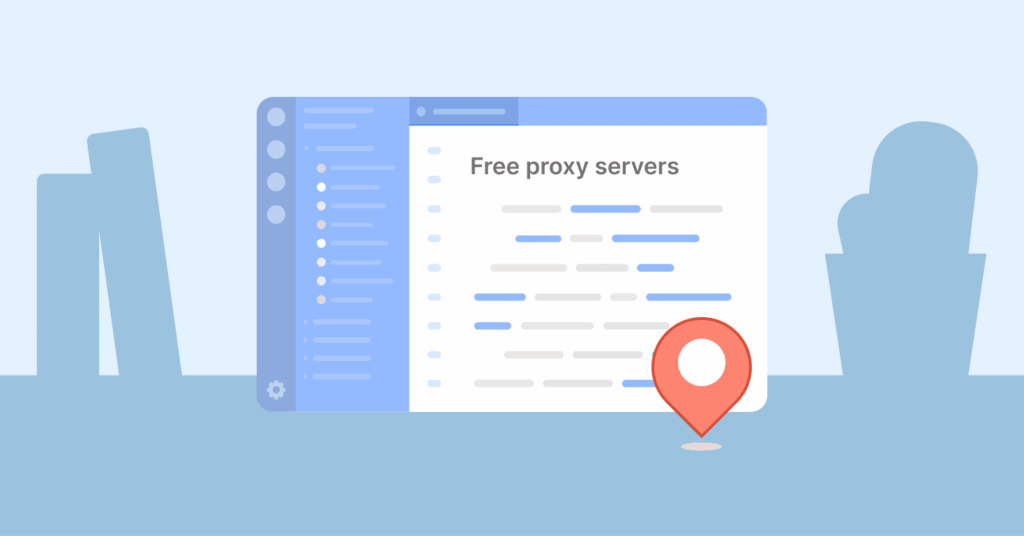
No! Free proxy servers pose very significant risks that far outweigh the risks of the reduced cost.
Here’s what happens when you use free proxies:
- Log your data: Free services also need to find ways to make money. Some of them sell your browsing data to advertisers, and sometimes even worse. Your IP address, what websites you have visited, and your login credentials could end up with the wrong people.
- Serve ads: Free proxies will often modify the web page they send you with their advertisements. Not only does that tank your browsing speed, but you’re also rolling the dice on malware, not exactly a win-win situation here.
- Often slow as molasses, and honestly, about as reliable as a wet paper bag: Hundreds of people share the same free proxy IPs. They often disconnect every now and then, and with slow speed. Also, free proxy IPs will get blocked more quickly by websites than paid ones.
- They’re not encrypted: Most free proxies run HTTP instead of HTTPS. In most cases, your data simply travels in plain text, allowing anyone to monitor the connection and maybe even steal passwords and personal information.
- They are likely to have malware: Some free proxy services are honeypots created by bad actors. They inject malware into users’ devices or steal their credentials.
Options to obtain the best free proxy server are almost always dubious at best. Even reputable companies that provide free trials have limits on bandwidth, locations, or time.
If you’re on a budget, we’d suggest you go for affordable residential proxies from established providers like IPRoyal and Proxy-Seller instead of free ones. At least, these won’t compromise your security. For anonymous browser capabilities, the Tor browser can provide you with better protection than any free proxy service.
Looking for a truly safe, free proxy? Getting the best proxy server free of charge might not really be possible. We suggest using some of the best proxy server services during their free trials. For example, Bright Data offers a free trial for 7days for registered users, and many other companies offer a guaranteed refund.
Tips for Choosing the Right Proxy Server
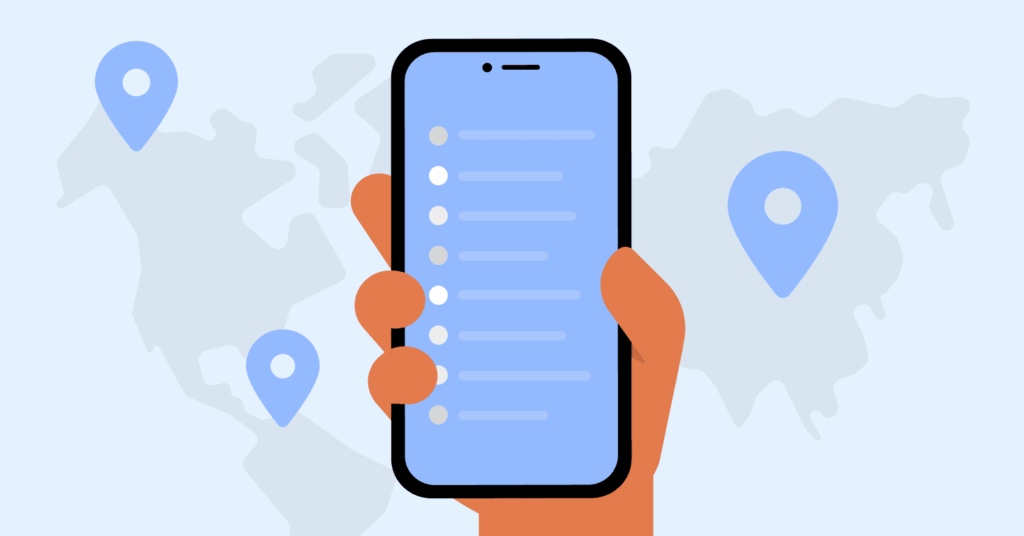
How then are you going to choose one from this awesome list? You’re not just grabbing any proxy server free service that you can find. You need to think. Consider these as you choose:
1. What is your use case?
Your primary use should be your guide when you are thinking about getting a proxy server. Are you scraping data on a large scale? You will need reliable residential proxies that will not get blocked. Are you managing multiple social media accounts?
You will want to consider a provider that has solid anti-ban technology. Or are you looking for the best proxy server for gaming? For that, low latency would be your must-have feature.
Don’t just grab any tool and hope for the best; make sure whatever you pick actually fits what you’re trying to do. Nothing worse than wrestling with the wrong thing for the job.
2. What kind of IP do you need (residential or datacenter)?
Sounds a bit nerdy, but trust us, it matters:
- Residential IP: These are from actual Internet Service Providers. They will look like traffic from a real person with a real internet connection, and they will be much harder for the websites to identify and ban you. You will need to use residential IPs for serious, undetectable data acquisition.
- Datacenter IP: These are from cloud servers, and they are much cheaper and faster, but way easier for websites to identify and block. They are better for tasks where speed is most important, and anonymity is less crucial.
3. Your location
If possible, always choose a server that is nearest to you. Why? Though proxies are generally fast (without the heavy encryption), your data will still have to travel a certain distance. Sending your requests on a cross-country trip will add a couple of extra milliseconds of delay, which can really slow things down. A nearby server will help maintain a zappy connection.
4. How important is geo-targeting?
Do you actually need an IP from a certain country, city, or even a particular mobile carrier? That’s kind of a big deal for planning. Heads up, not every provider’s going to give you the same detail when it comes to local search results or ads. If that stuff matters to you, definitely keep it in mind before picking who you go with.
5. Know the protocol
You can think of the protocol as how your device interacts with the proxy. Not exactly thrilling, but super important, especially if you’ve got anything sensitive floating around.
- SOCK5: Kinda like the cool kid here, works with basically any traffic, but needs you to log in (so, not just anyone can see what you’ve got going on). But heads up, it doesn’t actually scramble your data. So while it’s flexible, don’t count on it to keep everything secret. Still, it is a solid ‘all-around’ protocol.
- HTTP/HTTPS: This proxy works specifically for web browser traffic. Always choose HTTPS (the ‘S’ stands for secure) for this type of proxy – as opposed to ‘HTTP,’ which sends data in the open.
- Shadowsocks: This strong open-source protocol is widely used to bypass censorship and is renowned for its speed and efficiency.
For the average user, SOCKS5 or HTTPS will suit all the basic needs.
6. How much are you willing to pay?
Proxy offerings can cost anywhere from a few dollars to thousands per month. While it is possible to find cheap residential proxy options, keep in mind the old proverb: “You get what you pay for.”
Lower cost might compromise reliability, speed, and trustworthiness. Some cheap or free proxies might even use questionable data practices. Set a practical budget for the performance level you’re seeking.
Why Should You Use a VPN or a Proxy?
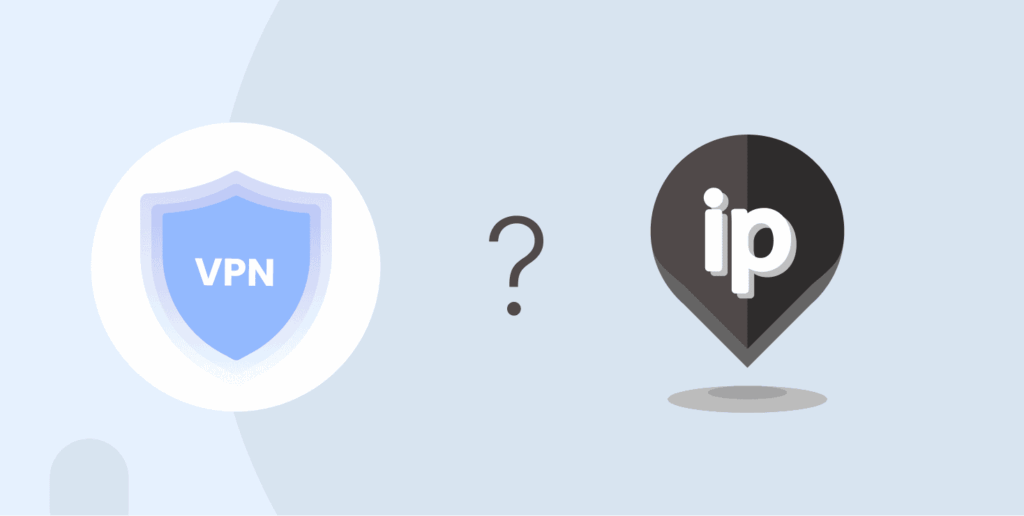
While both are capable of masking your IP address, the technique with which they do it is different. Knowing when to use a VPN or Proxy can save the user time and money.
Proxy
A proxy only gives a route for the user’s internet traffic through an alternative, intermediate server. This is often fast because a proxy does not encrypt information. Proxies work best for jobs that give the user task-specific premises, like web scraping data, accessing limited time only content, or controlling multiple social media accounts at once. The best proxy browser extensions will allow you to change your location quickly.
Use a proxy when:
- You have to quickly access a geo-blocked website
- You are managing multiple accounts on the same platform
- You are scraping data from the web or doing SEO research
- Speed matters more than privacy and security
- You want to route certain applications to different IP addresses
VPNs
VPNs essentially wrap your entire device in an invisible shield, sending all your online activity through a secure, encrypted tunnel. NordVPN is a pretty solid choice, honestly. If you’re using WiFi at a coffee shop or maybe torrenting your favorite show, you’ll want that extra layer of protection.
If your primary need is security and privacy for all your device’s traffic, our guide to the best USA VPNs is an essential resource.
The best proxy VPN combination provides the best speed and security, but comes at a higher cost. For gaming, usually a VPN is better than a proxy. The best proxy server for gaming will offer the lowest latency; however, in addition, a VPN can protect you from DDoS attacks. Many gamers will often use both a VPN and the specific proxy that they need for accessing the different regional servers.
Use a VPN when:
- You are on public WiFi and require security.
- You want to mask your entire internet activity.
- You are accessing sensitive accounts like banking.
- You require device-wide protection.
- Privacy is your number one concern.
Final word
Selecting a quality proxy provider may seem complicated, but it’s not impossible. Whether you enjoy the raw power that Bright Data provides, the convenience of SOAX, or the straightforward pricing IPRoyal offers, there’s a provider for you.
Don’t risk it all on a free service. Legitimate services will have free trials to give you an opportunity to test out at least the features you wish to use. For real, paying a few bucks a month to feel safe online is 100% worth it. Know what you need first, then set a budget that is not going to break the bank, and go from there. You’re about to make the internet way less annoying – cheers!
FAQs
Generally speaking, proxy servers are not illegal, but using a proxy server to commit illegal acts- such as hacking or piracy- would not be legal. Check your local laws.
These two tools serve different purposes. Proxies work better for specific tasks like web scraping, while VPNs provide stronger privacy and security by protecting your entire device with end-to-end encryption.
There isn’t a single “best proxy browser,” but some browsers stand out for offering stronger privacy features. Brave and Firefox, for example, play nice with proxies and help you wrestle back a bit of control over your online life.
Technically, yes, but honestly, it’s not great. VPNs usually win here—they’re more stable, less laggy. If you’re really a serious gamer, a VPN is your best bet; don’t cheap out with proxies.
Many websites block proxy users, so yes. Using residential proxies, which are harder to detect, can lower your chance of being banned by websites, but violating a site’s rules can still get your account banned.
The best proxies for appearing like a real human user are residential IP addresses. Datacenter IP addresses are the fastest proxies, but are also easier to detect and block. ISP proxies are a good intermediate between speed and appearing normal.
